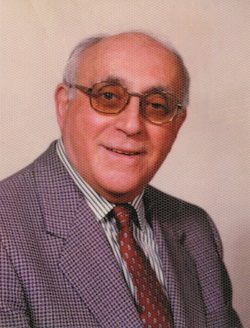 |
|
|
[Page 212]
|
Hillel Adler was born in Ozarow, Poland on July 25, 1920 into a family of masons and bakers. Shortly after his birth, his father died, leaving his mother Rachel as the sole support of Hillel and his older brother Shimon, together with four other children born of her husband's earlier marriage to her own sister. The family was poor to the point where having enough to eat was a source of constant anxiety.
At age 7 Hillel entered the Polish school, while continuing to attend the cheder as well. Although he was an excellent pupil, the family's poverty made it necessary for him to start working at odd jobs very young. When he was 14, he became an apprentice in the manufacture of boot uppers and earned his living at that trade until the war.
In September 1942, he was abruptly separated from his family and deported with other Ozarow youth. Interned successively at the Skarzysko (Poland), Buchenwald (Germany) and Theresienstadt (Czechoslovakia) camps, he survived the war only to learn that his entire family had been wiped out. He decided to go to Paris where two of his half-brothers had settled in the 1930's. There he found Raca (Régine) Grynberg, who also had been deported from Ozarow. They married in November 1947 and had a daughter, Renée.
In Paris Hillel worked as a tailor, then as a hotelier. He led a quiet, honest and respectable life.
But all through his years in France, he could not stop thinking of the past which haunted him. That is why when he retired, he resolved to bear witness for future generations. It was thus that this book came to life.
Hillel Adler died in Paris on January 25, 1996.
This is a translated extract from a letter I wrote on March 3, 1996 to Régine, his widow, and Renée, his daughter, following his death.
“Please excuse me for not writing to you sooner after the death of your dear Hillel. It has been easier for me to be involved in all of the little details (about publication of the translation) related above than to send you a few simple words of condolence — even in English — on his passing. Perhaps I was hoping, implicitly, that our project could go on indefinitely, with his full knowledge and collaboration. I wanted to maintain my memory of him, still so fresh, from 1966-67 when he was even younger than I am as I write this letter; when we were all younger.
[Page 213]
His life inspires the highest admiration. In spite of all of the obstacles of his youth — the loss of his father before his adolescence, poverty, an interrupted education and the brutal extinction of his family and native village — with his courage and optimism, he was able to triumph by building such a fruitful and generous life in France, a life which he shared with you, and which thanks to his book, he will share with future generations descended from Ozarow. This book is more than a monument to that vanished world; it is also his.”
|
|
JewishGen, Inc. makes no representations regarding the accuracy of
the translation. The reader may wish to refer to the original material
for verification.
JewishGen is not responsible for inaccuracies or omissions in the original work and cannot rewrite or edit the text to correct inaccuracies and/or omissions.
Our mission is to produce a translation of the original work and we cannot verify the accuracy of statements or alter facts cited.
 Ożarów, Poland
Ożarów, Poland
 Yizkor Book Project
Yizkor Book Project
 JewishGen Home Page
JewishGen Home Page
Copyright © 1999-2026 by JewishGen, Inc.
Updated 13 Oct 2017 by LA